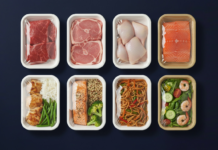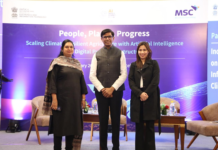
In the picturesque district of Koraput, home to the indigenous people of Odisha, women are both guardians of their agricultural heritage and champions of change.
Women from tribal communities are known to be socially cohesive, preserving and passing on indigenous knowledge while creating buy-in to new solutions that align with their values. Keeping with their ethos, pulse cultivation methods introduced through the ‘Comprehensive Project on Rice Fallow Management’ in 2022-2023, steered away from chemical fertilizers or pesticides to the best extent possible.
The project was implemented by the International Crops Research Institute for the Semi-Arid Tropics (ICRISAT) in partnership with the Government of Odisha and with the support of Pragati, a local NGO.
Jacqueline d’Arros Hughes, director general of ICRISAT, commended the project’s on-the-ground impact. “Project reports indicate that 53% of registered farmers are women, who have seen significant income gains from growing pulses in rice fallows,” stated Hughes. “Additionally, the increase in dietary diversity and the rise in daily per capita pulse consumption to 40 grams, meeting the Indian Council of Medical Research guidelines, are notable achievements.”
The introduction of short-duration pulses – chickpea and black gram – that are ready to harvest in just 90-100 days and can thrive during the post-rainy season (rabi) in the residual moisture of the rice fallows was critical to the project’s success.
“The project inspired close to 62% of participating farmers to cultivate a second crop for the first time in the last five years. Cultivation of rice fallows doubled, and the productivity of black gram and chickpea increased significantly,” said Sean Mayes, global research program director, Accelerated Crop Improvement, ICRISAT.
Roping in the Leaders of Change
In most communities, ensuring gender balance in project involvement helps create a level playing field. In this project, it meant engaging the leaders of change, as women play an active role in decision-making.
“I have witnessed women’s networks creating a supportive environment for knowledge sharing, skill development, and collective decision-making,” said Manzoor Dar, global head – seed systems, principal scientist, ICRISAT.
“The collective mindset of the women in tribal communities made it easier for us to collaborate on the project, as the women discussed what was shared in the awareness sessions among themselves. Additionally, women are generally more eager and patient than men to try new techniques like line sowing and post-harvest technologies,” said Amrita Pal, associate manager, seed systems, ICRISAT.
Impact on Diets
Through project interventions, food security and nutritional status improved, with per capita daily pulse consumption increasing from 31.7 grams to 40.2 grams. The project results also indicated a significant enhancement in minimum dietary diversity among women (MDD-W) aged 15-49 years rising from 29.7% to 43.9%, with pulses playing a substantial role in achieving this improvement.
Monetary Gains
Early participants in the project recorded a one-third increase in rabi farm income and a one-tenth increase in overall farming compared to the previous year. Farmers were able to sell a portion of their harvest left after meeting household consumption needs.
Upskilling extension staff and farmers
Training sessions for both the staff of the NGO partner and the farmers—ranging from using a new monitoring and evaluation tool, collection of GIS and soil analysis data, and creating awareness of good agricultural practices—were critical to the success of the project.
Replicable model
The ‘Comprehensive Project on Rice Fallow Management’ presents a successful gender-inclusive model for intensifying pulse cultivation in rice fallows. With the support of the Government of Odisha, the project methodology was scaled up in eight districts of Odisha, currently benefiting 152,601 farmers. The project enrollment statistics, however, emphasize the need for greater efforts to promote gender inclusivity and hold significant implications for policymakers advocating for the scaling of this approach.
Click here to watch the project video.
IndiFoodBev — authentic, impactful and influential
An English-language food and beverage processing and packaging industry B2B platform in print and web, IndiFoodBev is in its third year of publication. It is said that the Indian food and beverage industries represent approximately US$ 900 billion in revenues which implies more than 20% of the country’s GDP. Eliminating the wastage on the farmside can help to deliver more protein to a higher number of the population apart from generating sizable exports. The savings in soil, seeds, water, fertilizer, energy and ultimately food and nutrition could be the most immense contribution that country is poised to make to the moderation of climate change.
To improve your marketing and grow sales to the food and beverage processing and packaging industry, talk to us. Our research and consulting company IppStar [www.ippstar.org] can assess your potential and addressable markets in light of the competition. We can discuss marketing, communication, and sales strategies for market entry and growth.
Suppliers and service providers with a strategy and budget for targeted marketing can discuss using our hybrid print, web, video, and social media channels to create brand recognition linked to market relevance. Our technical writers are ready to meet you and your customers for content.
The second largest producer of fruit and vegetables in the world is continuously expanding processing capacities and delivery systems with appropriate innovative technologies. We cover product and consumer trends, nutrition, processing, research, equipment and packaging from farm to thali. Get our 2025 media kit and recalibrate your role in this dynamic market. Enhance your visibility and relevance to existing markets and turn potential customers into conversations. Ask for a sample copy of our bi-monthly in print or our weekly IndiFoodBev eZine each Wednesday.
For editorial info@ippgroup.in — for advertisement ads1@ippgroup.in and for subscriptions subscription@ippgroup.in
Naresh Khanna – 10 February 2025
Subscribe Now










